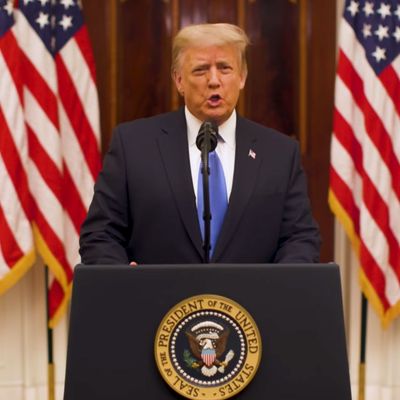
A presidential farewell address is a distinctive form of American oratory that, by tradition, almost necessarily contains warnings about the future. George Washington warned about the dangers of foreign entanglements; Dwight Eisenhower warned about the military-industrial complex.
The meat in Donald J. Trump’s farewell address, surrounded by the stale bread of boasting about his puffed-up list of achievements, was a warning about progressive intellectual fads. In the unlikely event that his 20-minute-long on-message reading is remembered for anything, it will be for his lusty attacks on left-wing skepticism about the foundations of American history:
Now, as I leave the White House, I have been reflecting on the dangers that threaten the priceless inheritance we all share. … What has always allowed America to prevail and triumph over the great challenges of the past has been an unyielding and unashamed conviction in the nobility of our country and its unique purpose in history. We must never lose this conviction. We must never forsake our belief in America.
And he waxed rhapsodic about the American belief in free and open debate:
At the center of this heritage is also a robust belief in free expression, free speech, and open debate. Only if we forget who we are, and how we got here, could we ever allow political censorship and blacklisting to take place in America. It’s not even thinkable.
The ideological strains he attacks here are not figments of Trump’s imagination. Many leftists deny or downplay the uplifting elements of American history and portray it as little more than bloodstained conquest and plunder. Many leftists also seek to intimidate and shut down opposing views rather than attempt to engage with them democratically. The trouble is that Trump has exceeded even his most extreme left-wing counterparts on both scores.
Trump has long praised and emulated dictators and flayed the United States for its weakness. More than three decades ago, Trump praised the Chinese Communist Party for its bloody crackdown on a peaceful demonstration in Tiananmen Square (which he called a “riot”): “That shows you the power of strength. Our country is right now perceived as weak.” As president, he has continued to disabuse his country of any pretense of its own innocence. When told that Vladimir Putin, a subject of unique Trump admiration, was a killer, the president replied, “There are a lot of killers. You think our country’s so innocent?”
Trump’s analysis of America’s character is indistinguishable from Noam Chomsky’s or Howard Zinn’s. Morality is merely a hypocritical pretense used by the strong to justify their domination. The difference is that left-wing skeptics of American exceptionalism at least believe that subjugating smaller countries in order to exploit them and enrich ourselves is bad. Trump believes it is good, and our main historic error is a prissy refusal to exploit weaker countries as ruthlessly as possible.
The intelligent version of the American civic creed — the version former president Barack Obama embraced — is to acknowledge the cruel and undemocratic episodes and themes in American history, while trying to elevate the noble ones as emblematic of our civic creed, so as to inspire future generations to emulate our best moments. Trump, in pointed contrast, elevates the bloodiest and ugliest parts of American history as an ideal. He has made a point of venerating Andrew Jackson, whose presidency was centered around driving Native Americans off their territory to clear more land for white slaveholders. He invented a fictitious history in which General Pershing committed war crimes against Muslim prisoners. In both cases, his goal was to displace the traditional ideal of American history with a darker version, teaching the country to discard its ideals and see the world as Trump does, as a zero-sum conflict where the strong prey upon the weak.
Trump’s praise for free speech is more laughable still. While every president has complained about critical press coverage, no president has so utterly refused to recognize the right of the press to publish unflattering stories as Trump. He has called the media the “enemy of the people” and worked assiduously to control friendly media outlets behind the scenes. He has bullied the owners of CNN and the Washington Post by threatening adverse regulatory treatment unless they scale back critical coverage.
Trump felt so aggrieved by peaceful protests of police brutality by NFL players that he pressured the league’s owners to crack down on those brief displays of individual dissent. When the league’s owners blacklisted Colin Kaepernick, who was surely good enough to get a roster spot somewhere, he boasted that they did so out of fear of him. Trump does oppose “political censorship and blacklisting”; he merely believes he should be the one who picks the target.
Trump portrays himself as a champion of a rowdy and free exchange of ideas: “America is not a timid nation of tame souls who need to be sheltered and protected from those with whom we disagree.” And yet his administration forcefully attacked completely peaceful protesters who had the temerity to march near the White House and then surrounded the compound with a wall to spare his fragile ego the sight of Americans registering their disagreement.
Trump seized upon the themes of patriotism and free speech because he — or, more likely his speechwriter — recognized a vulnerability on the left he could fruitfully attack. And yet, ironically, the ugliest strains of illiberalism and moral nihilism on the left have been exceeded in every way by Trump himself. His contempt for democracy, the rule of law, and American ideals has struck a grievous blow to those ideals. The greatest source of comfort for those who cherish them is that Trump was defeated.






























